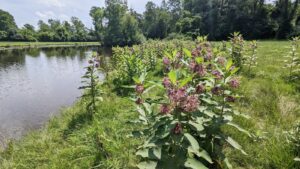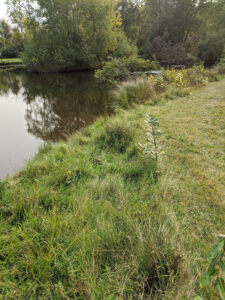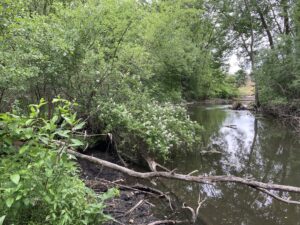Legacy Land Conservancy is pleased to announce it has permanently protected land with 1,350 feet of water frontage on the south bank of the Grand River in Jackson County.
The landowners–James and Joyce Grace–are delighted to protect their riverfront property in Summit Township via a donated conservation easement with Legacy, which offers permanent protection of privately-owned land. A conservation easement conserves the land forever while allowing it to remain in private ownership.
“When we bought the land, our goal was to conserve it and keep it in its natural state, not only for our benefit, but for the benefit of the community too,” the Graces said. “Although it’s not open to the public, you can’t drive down Winbar Drive without enjoying the scenic view. And more importantly, we’re thrilled our undeveloped land helps water quality and eases the flooding effects of heavy rain for those living downriver.”
The 8-acre easement, aptly named River Hills for its waterfront locale and upland woods features, sits between the Grand River and suburban neighborhoods to the south. While smaller than conservation easements Legacy typically protects, with 1,350 feet of frontage on the River the property is noteworthy for its natural and permeable floodplain habitat. This provides for flood and erosion mitigation and groundwater recharge within the Upper Grand River watershed, and it helps to ensure the quality and quantity of water resources for the Jackson area, Lake Michigan, and the entire Great Lakes basin.
River Hills is also directly upriver of the city of Jackson. By conserving it and other nearby floodplain, wetlands, and forested areas, the land directly helps reduce the impacts of heavy rain storms and flooding within the City.
Additionally, Ella Sharp Park, which is located in the city limits of Jackson and contains over 300 acres of natural area, is immediately adjacent to River Hills. The contiguous habitat adds to vital corridor wetlands and upland habitats that serve as a connection for wildlife movement along the Grand River, creating a natural “greenway” through an otherwise urbanized area. Nearby conserved natural areas also include the privately-owned Bigelow Conservation Easement held by the Dahlem Conservancy.
In addition to ample deer, goose, and turkey populations, as well as sightings of pileated woodpecker (Dryocopus pileatus), the existence of bald eagle (Haliaeetus leucocephalus), a species of special concern in Michigan, has been observed on the property.
“What happens on the land in watersheds like the Upper Grand carries significant impact for the community that can go unnoticed by many,” Legacy Land Conservancy Executive Director Diana Kern said. “Legacy is proud to protect land, especially forested land along rivers, that positively benefits water quality and quantity locally and throughout the Great Lakes.”
History of the River Hills land
The property was once a part of the estate of Theodore G. Bennett, known as The Bennett Farm. The iconic stone buildings (on adjacent lands) were constructed in the early 1880s. Bennett was president of Jackson’s Bennett Sewer Pipe Company and owner of the Bennett Clay Machinery Company. After Bennett’s passing in 1897 the property and adjacent lands were purchased by Hubert F. Probert, who operated the land now called Oakcroft, as a dairy farm of some renown. In 1943 the property was sold to Townsend Beaman, a patent attorney and inventor. The Beamans operated Jaxon Wire Products out of one of the stone barns on adjacent property, and kept pigs, sheep, cows, horses, and fruit orchards on the farm, which was called Stone Village. Between 2010 and 2017, the property was subdivided and the barn complex was converted into the Stone Village Condominiums, consisting of three unique private residences. The current conservation easement property portion was purportedly utilized as pasture and/or for hay cultivation.








 RSS Feed
RSS Feed